You can run forward and reverse lineage analysis to trace metadata at the system level. Forward lineage analysis generates lineage with the system as source. And, reverse lineage analysis generates lineage with the system as target. The Dual-Combined View lineage analysis generates a lineage, which includes both forward and reverse lineage.
Viewing Lineage
To run lineage analyzer at the system level, follow these steps:
- Go to Application Menu > Data Catalog > Mapping Manager.
- In the Workspace Mappings pane, click the required mapping.
- Select a row.
- Right-click a system and hover over Lineage Analyzer.
- Hover over any one of the following:
- Forward: Use this option to view forward lineage.
- Reverse: Use this option to view reverse lineage.
- Dual - Combined View: Use this option to view combined forward and reverse lineage.
- Use the following options:
- All Projects
- Use this option to include all the projects in lineage analysis.
- By Project
- Use this option to select projects for lineage analysis.
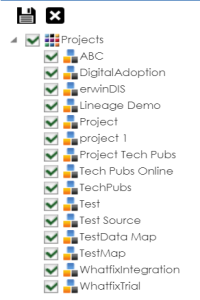
- By default, all projects are selected. Clear the check boxes for the projects that are not required. Then, click
 .
.
The Mapping Specification grid appears.
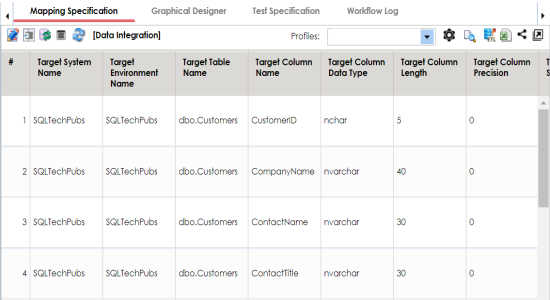
The options available for Lineage Analyzer appear.
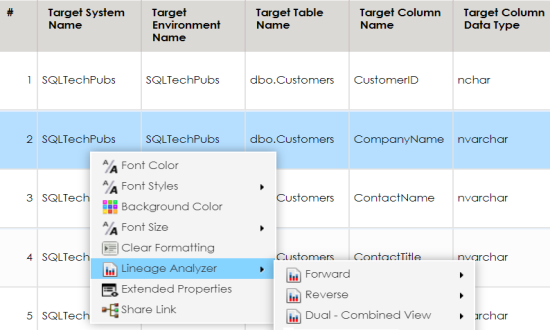
For example, when you hover over Forward, All Projects and By Project appear as options.
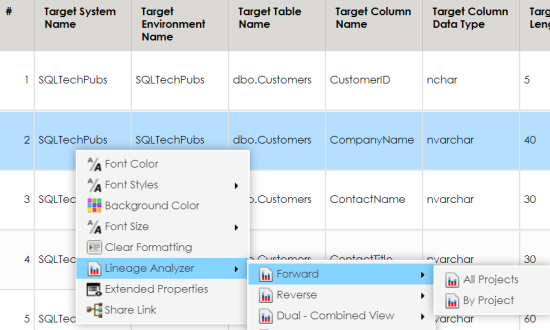
The system's lineage is generated based on the options you selected.
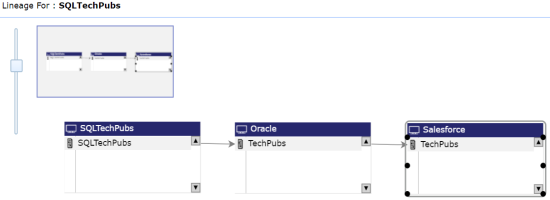
Working on Lineage
Lineage of a system shows how metadata moves through systems. It provides a summary of environments used as source and target. Also, it gives you information about the systems and environments involved in the lineage.
For example, the following image displays a system's lineage.
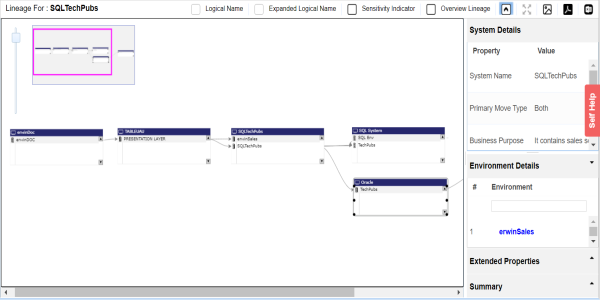
Use the following options:
Use this option to view sensitivity of the environments in the lineage.
For example, in the following lineage, the SQLTechPubs and SQL Env environments are sensitive.
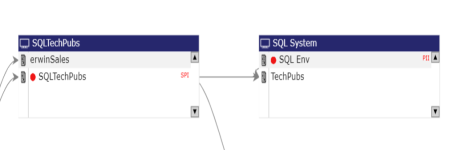
Use this option to switch between detailed and overview lineage view.
Detailed lineage view: This view is helpful to technical users like ETL developers. When you reverse engineer ETL jobs or SQL scripts, the lineage might contain temporary tables, ETL components (filters, joiners, routers etc.). This view includes systems and environments, that do not exist in the Metadata Manager.
For example, the following lineage displays the erwinDOC system and erwinDOC environment. These do not exist in the Metadata Manager.

Overview lineage view: This view is helpful to business users. It excludes systems and environments that do not exist in the Metadata Manager.
For example, the following lineage does not display erwinDOC system and erwinDOC environment. These do not exist in the Metadata Manager.

Use this option to switch between collapsed and expanded view. The expanded view includes environments involved in the lineage and the collapsed view excludes environments in the lineage.
For example, in the following lineage the collapsed view does not display environments involved in the lineage.

This switch is enabled when you use the expanded view (![]() ). Use this option to switch between the Auto Expand view and Auto Fit view. The Auto Expand view shrinks the space for the list of environments and the Autofit view expands the space to fit the list of environments.
). Use this option to switch between the Auto Expand view and Auto Fit view. The Auto Expand view shrinks the space for the list of environments and the Autofit view expands the space to fit the list of environments.
For example, the following lineage displays the Auto Expand view.

Use this option to download the lineage in the JPG format.
Use this option to download the lineage in the PDF format.
Use this option to download the lineage in the XLSX format.
To highlight an environment's lineage path, click the environment. The environment is highlighted in orange color, its forward lineage path appears in red, and its reverse lineage path appears in blue.

Systems that are not part of a lineage path disappear. For example, in the following lineage, the Oracle system disappears in the lineage path with respect to the erwinSales environment.

By default, this pane displays properties of a system for which, you ran lineage analysis. You can click a system in the lineage to view its properties in this pane.
By default, this pane displays a list of environments under the system for which, you ran lineage analysis.
You can click a system in the lineage to view list of environments under the system. You can then click <Environment_Name> to view lineage of the environment.
Environments that are not involved in lineage, are not included in the list.
By default, this pane displays the extended properties of a system for which, you ran lineage analysis. You can click a system in the lineage to view its extended properties in this pane.
For more information, on configuring extended properties of a system, refer to the System topic.
This pane displays a summary of the lineage report. It gives information about number of environments acting as source, target, or both in the lineage.
|
|
|
Copyright © 2021 erwin, Inc. All rights reserved. Copyright © 2021 Quest Software Inc. All rights reserved. All trademarks, trade names, service marks, and logos referenced herein belong to their respective companies. |